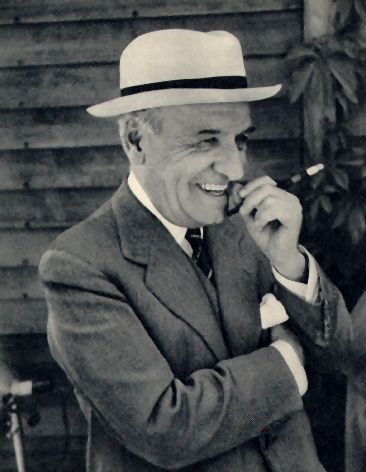Ser de la izquierda es, como ser de la derecha, una de las infinitas maneras que el hombre puede elegir para ser un imbécil: ambas, en efecto, son formas de la hemiplejía moral.
La rebelión de las masas, "Prólogo para franceses" (1937).
José Ortega Y Gasset Frases famosas
Citações de vida de José Ortega Y Gasset
Quien en nombre de la libertad renuncia a ser el que tiene que ser, ya se ha matado en vida: es un suicida en pie. Su existencia consistirá en una perpetua fuga de la única realidad que podía ser
citado em Transitos - Página 16, Francisco De Borja Gutierrez - Erroteta, 2005, ISBN 849343230X, 9788493432300, 81 páginas
Atribuídas
The Revolt of the Masses
José Ortega Y Gasset frases e citações
“Eu sou eu e minha circunstância, e se não salvo a ela, não me salvo a mim.”
Fonte: "Meditações do Quixote"
Fonte: "O Livro das Missões"
Variante: O que distingue um grande poeta é o fato dele nos dizer algo que ninguém ainda disse, mas que não é novo para nós.
José Ortega Y Gasset: Frases em inglês
“The metaphor is perhaps one of man's most fruitful potentialities.”
"Taboo and Metaphor"
The Dehumanization of Art and Ideas about the Novel (1925)
Contexto: The metaphor is perhaps one of man's most fruitful potentialities. Its efficacy verges on magic, and it seems a tool for creation which God forgot inside one of His creatures when He made him. All our other faculties keep us within the realm of the real, of what is already there. The most we can do is to combine things or to break them up. The metaphor alone furnishes an escape; between the real things, it lets emerge imaginary reefs, a crop of floating islands. A strange thing, indeed, the existence in man of this mental activity which substitutes one thing for another — from an urge not so much to get at the first as to get rid of the second.
Chap. VIII: The Masses Intervene In Everything, And Why Their Intervention Is Solely By Violence
The Revolt of the Masses (1929)
Fonte: The Revolt of the Masses (1929), Chapter XV: We Arrive At The Real Question
Fonte: The Revolt of the Masses (1929), Chapter XIII: The Greatest Danger, The State
Fonte: The Revolt of the Masses (1929), Chapter XIV: Who Rules The World?
Fonte: The Revolt of the Masses (1929), Chapter XII: The Barbarism Of "Specialisation"
Fonte: The Revolt of the Masses (1929), Chapter XIII: The Greatest Danger, The State
Fonte: History as a System (1962), p. 16
Horace, Odes, III.6]
Chap. III: The Height Of The Times
The Revolt of the Masses (1929)
Fonte: History as a System (1962), p. 13
Fonte: What is Philosophy? (1964), p. 19
Fonte: The Revolt of the Masses (1929), Chapter XII: The Barbarism Of "Specialisation"
Fonte: The Revolt of the Masses (1929), Chapter XIV: Who Rules The World?
“Man has no nature”
History as a System (1962)
These are the ascetics.
Chap. VII: Noble Life And Common Life, Or Effort And Inertia
The Revolt of the Masses (1929)
Fonte: The Revolt of the Masses (1929), Chapter XI: The Self-Satisfied Age
Fonte: What is Philosophy? (1964), pp. 16-17
“Man has no nature”
History as a System (1962)
Chap. VIII: The Masses Intervene In Everything, And Why Their Intervention Is Solely By Violence
The Revolt of the Masses (1929)
“I am I and my circumstance, and if I don't save it I don't save myself.”
Meditations on Quixote (1914)
Fonte: The Revolt of the Masses (1929), Chapter XV: We Arrive At The Real Question
